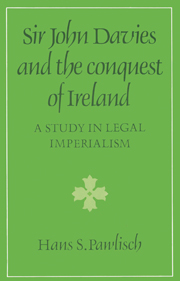Book contents
- Frontmatter
- Contents
- Preface
- Abbreviations
- PART I INTRODUCTION
- PART II JUDICIAL ENCOUNTERS: THE NATIVE COMMUNITY
- PART III JUDICIAL ENCOUNTERS: THE COLONIAL COMMUNITY
- PART IV CONCLUSION
- 9 Sir John Davies, the ancient constitution and civil law
- Notes
- Select bibliography
- Index
- Cambridge Studies in the History and Theory of Politics
9 - Sir John Davies, the ancient constitution and civil law
from PART IV - CONCLUSION
Published online by Cambridge University Press: 13 October 2009
- Frontmatter
- Contents
- Preface
- Abbreviations
- PART I INTRODUCTION
- PART II JUDICIAL ENCOUNTERS: THE NATIVE COMMUNITY
- PART III JUDICIAL ENCOUNTERS: THE COLONIAL COMMUNITY
- PART IV CONCLUSION
- 9 Sir John Davies, the ancient constitution and civil law
- Notes
- Select bibliography
- Index
- Cambridge Studies in the History and Theory of Politics
Summary
The chapters dealing with the case of the Bann fishery and the case of mixed money have demonstrated how Sir John Davies, as Irish Attorney-General, supported both private and public interests in Irish litigation through argument from Roman law. In these and other cases in the Reports, Davies' use of continental law was so extensive as to cast doubt upon the conventional notions of an insular common law mentality put forward by Professor J. G. A. Pocock. In his well-known study, The Ancient Constitution and the Feudal Law, Pocock asserted:
There was no reason why a common lawyer should compare his law with that of Europe except an intellectual curiosity arising and operating outside the everyday needs of his profession.
This assumption that English lawyers practised their trade in a professional climate devoid of all practical contact with European law, is, however, extremely narrow and fails to take into consideration the extent to which common lawyers were exposed to the civil law tradition in the seventeenth century. The major points of contact with foreign legal sources were: the law practised in the numerous non-common law jurisdictions; the legal training at the universities and Inns of Court; the early Stuart political controversies concerning public law; and finally the movement for law reform that began at the end of the sixteenth century. All these influences gave common lawyers considerable exposure to the principles and procedures of the civil law, and as Davies' work in Ireland demonstrates, this familiarity often had concrete effects in the decisions rendered by common law judges in litigation pending before the central courts.
- Type
- Chapter
- Information
- Sir John Davies and the Conquest of IrelandA Study in Legal Imperialism, pp. 161 - 175Publisher: Cambridge University PressPrint publication year: 1985



